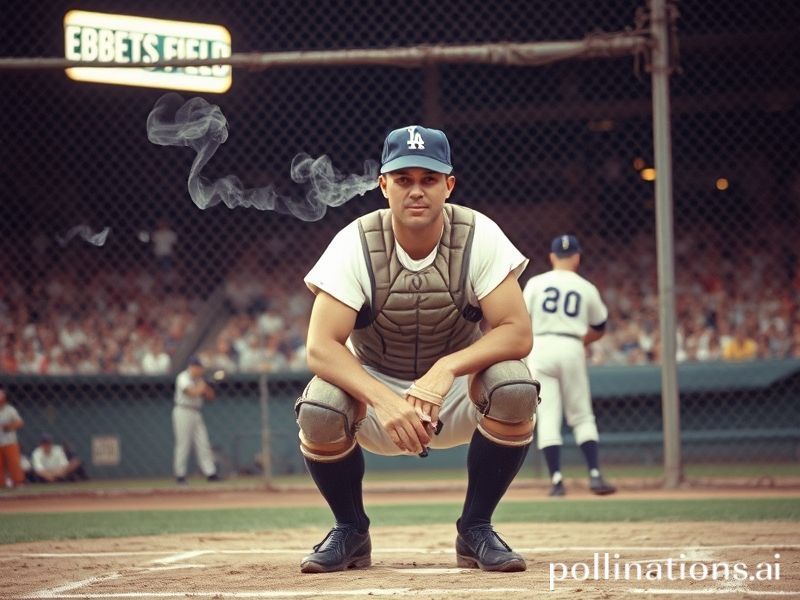Roy Campanella: The Catcher Who Became a Global Mirror for Hypocrisy
Roy Campanella, the Brooklyn Dodgers’ three-time MVP catcher, has long been filed under “American baseball legend” and left to gather dust alongside other sepia-toned curios. Yet if you squint past the nostalgia, Campy’s story turns out to be a surprisingly useful lens on the planet’s chronic inability to play fair—on the diamond, in passport queues, or at the United Nations buffet.
First, the basics for any reader who thinks baseball is just cricket for people who hate tea: Campanella integrated the minor-league Montreal Royals in 1946, a full year before Jackie Robinson made white U.S. sportswriters spill their bourbon. The city’s French-speaking populace, then busy debating whether Maurice “Rocket” Richard deserved a statue, treated Campanella with a politeness that would have seemed hallucinatory below the Mason-Dixon line. In other words, Canada managed to export ice, maple syrup, and basic human decency all in the same decade—an export mix that remains unmatched by most G7 nations today.
Zoom out and the Royals gig becomes a geopolitical parable. Campanella’s presence in Montreal coincided with the first sessions of the United Nations in nearby Lake Success, New York. While delegates in stiff collars argued over what to call the impending Cold War, a Black man wearing “ROYALS” across his chest was quietly demonstrating that integration works better in practice than in committee. The irony, of course, is that the UN’s own cafeteria was still segregated; apparently multilateralism stops at the mashed-potato station.
Back in the United States, Campanella’s eventual major-league stardom (1951–57 peak) coincided with the golden age of American soft power. U.S. propaganda reels showed him smashing home runs in Technicolor, proof that democracy let Black men swing for the fences—provided they didn’t try to vote in Birmingham. The State Department loved that narrative so much it sent jazz musicians abroad under the same slogan: “See? We’re not the country that just firebombed Dresden; look at these cool cats!” Campanella, alas, never got the jazzman’s tour bus; his passport was mostly stamped “Ebbets Field,” which limited his diplomatic utility to making Soviet catchers look like bronze statues.
Then came January 1958, when a car accident on an icy Long Island road left him paralyzed from the shoulders down. Overnight, the man who had crouched behind home plate for 100-win seasons became a global symbol of fragility. Newspapers from Lagos to Leningrad ran the same wire photo: Campy smiling in his wheelchair, because that’s what you do when the cameras are on and dignity is the only thing left that hasn’t been repo’ed. The image traveled farther than any home run, reminding humanity that sudden reversals of fortune are the one product every country manufactures in surplus.
Decades later, Japanese executives visiting Dodgertown asked to see Campanella’s old locker, hoping to bottle whatever residue of excellence clung to the hinges. They left with nothing but splinters and a souvenir baseball that turned out to be signed by the equipment manager. The moral: soft power is hard to replicate, especially once the souvenir shop starts cutting corners.
Today, as every nation tries to draft its own “inclusion playbook”—usually after a public-relations mushroom cloud—Campanella’s life offers a cynical cheat sheet. Step one: Poach talent from marginalized communities before your rival does. Step two: Celebrate them just enough to photograph well. Step three: When the bill arrives—in injury, injustice, or inflation—wheel out the feel-good footage again. Repeat every generation until the footage goes viral in 4K.
In the end, Campanella’s legacy is less about baseball than about the global talent for selective amnesia. Countries still segregate, exploit, and discard at roughly the same rate as in 1946, only now the discrimination comes with better graphics and a diversity statement. The man himself died in 1993, but the cycle he unwittingly choreographed plays on, an endless extra inning where nobody keeps score and the house always wins. Take a bow, Campy; the world’s still stealing home while pretending not to know the rules.







